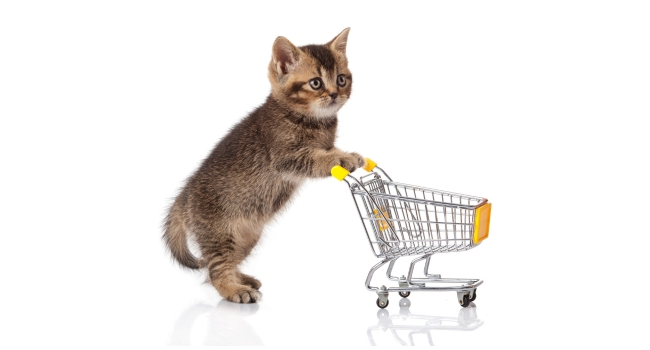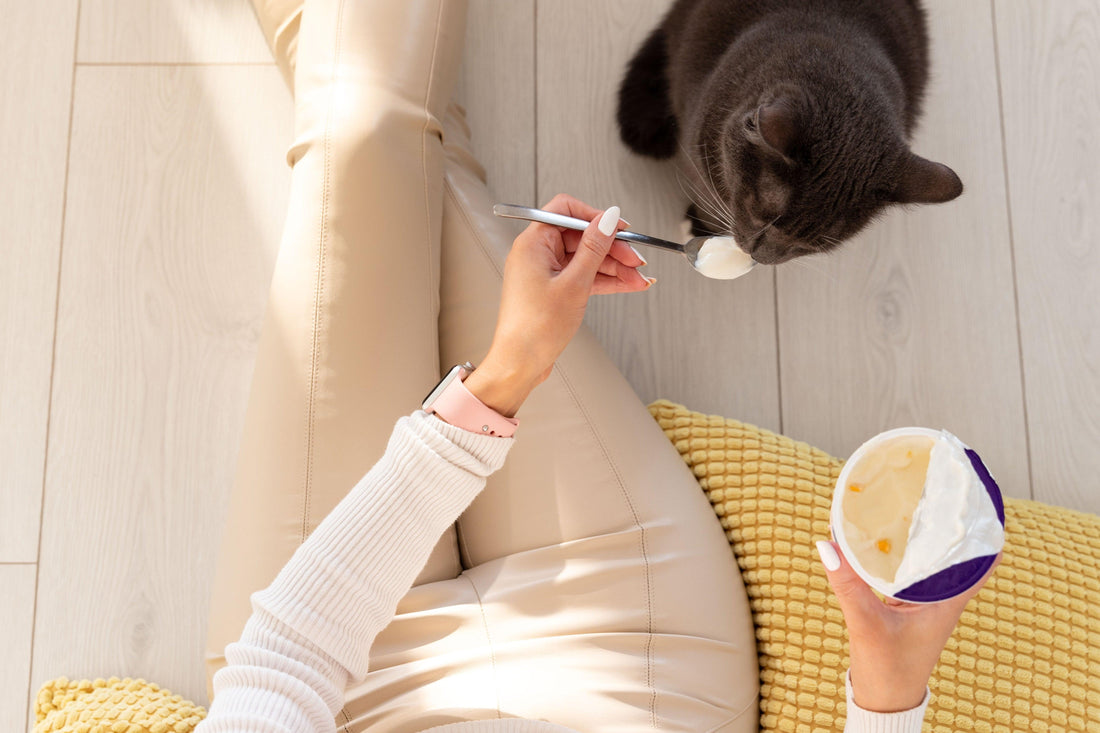There is no doubt that yogurt seems to be one of the healthiest and most delicious snacks. So many owners like to indulge their cats with it, but it turns out that giving them yogurt may not be such a good idea after all.
Therefore, as a pet lover, you will be interested in knowing: Can cats eat yogurt?
Luckily, this article explores whether or not cats can eat yogurt and if so, how much of it is safe for them to consume and under what circumstances this snack can be harmful to your cat’s health.
Keep Reading!
Can Cats Eat Yogurt?
Although yogurt is not an ideal treat for all felines, they can occasionally consume a small amount when it is plain and unsweetened.
Cats should be introduced to yogurt in a very small amount, as adult cats don't have enough lactase enzymes to break lactose down.
However, the lactose that yogurt contains is actually easier for cats to break down than other dairy products. Therefore, yogurt can be given sparingly to adult cats who can tolerate it.
Does Yogurt Have Any Benefits for Cats?
For those cats who can tolerate dairy products like yogurt, this delicious snack can offer a number of benefits.
For example, the probiotics in yogurt help to improve digestion which is very important for cats with sensitive stomachs.
It also helps to reduce the cat's susceptibility to allergies and strengthens its immune system. With all these great benefits, it's really up to your cat whether they want to try this delicious snack or not!
Note:
Although it's possible that yogurt can benefit your cat, there's no concrete evidence, so it's all speculative.
How Much Yogurt Can My Cat Have?

Treats or snacks should never comprise more than 10% of your cat's nutrition per day because they need a balanced diet that is composed of protein and nutrients from other sources as well.
Yogurt can be given in small amounts occasionally and it is recommended that you don't feed your cat more than 3 to 5 tablespoons per week because too much will put them at risk for obesity or stomach upset.
Can I Feed My Kitten Yogurt?
While it may seem like a harmless snack, feeding your kitten yogurt is not advised. Their stomachs are very sensitive and the probiotics in yogurt may not be good for them. Plus, the nutrients in yogurt are incomplete and inadequate for proper growth as well.
Feeding them foods that are not beneficial for their health can have negative effects on their development and put them at risk for certain diseases later in life.
Instead of feeding your kitten yogurt, it is recommended that you provide them with a healthy and complete diet by purchasing quality kitten food from your veterinarian or pet store.
It is always best to consult with your veterinarian before feeding anything to your kitten.
Can Cats Eat Greek Yogurt?
Cats can eat a little Greek yogurt as long as it is unflavored and contains no artificial ingredients. Greek yogurt is lower in lactose and sugar than traditional yogurt, so it will not upset your cat's stomach as much.
However, make sure to avoid flavored yogurt because it will have higher sugar content and may contain artificial ingredients that are harmful to your pet.
Cats should only have a little bit of Greek yogurt at most; too much can lead to digestive issues or weight gain.
Side Effects of Feeding Yogurt to Cats
Yogurt is a food that has many health benefits, but it is not necessarily the best choice for cats. Lactose and calories present in yogurt may contribute to the following health problems:
- Gastrointestinal Problems
- Obesity
- Diabetes
- Pancreatitis
- Allergic Reactions
Gastrointestinal Problems
Yogurt is a delicious snack, but it's not the best choice for your cat. Our feline friends are lactose intolerant and can't digest dairy products well.
Gastrointestinal problems are the most common indicators of lactose intolerance. Symptoms of lactose intolerance after consuming yogurt in cats include vomiting and diarrhea, but the following symptoms may also occur:
- Fever
- Lethargy
- Weakness
- Dehydration
- Loss of appetite
- Abdominal pain
Obesity
There is an increased risk of cat obesity when cats are given high-caloric treats, excessive amounts of food, or foods that are not balanced. Cats can become obese by eating yogurt, which is high in calories and artificial sweeteners.
The caloric requirement of cats is lower than that of dogs and other mammals, so they need fewer calories per day to remain healthy.
To prevent obesity, feed your cat a balanced diet and avoid sugary treats or foods that are high in calories.
Diabetes
Diabetes in cats is one of the most common long-term feline health conditions. It's caused when your cat eats too much sugar and their blood glucose levels get too high. If this goes on for a long time, it can eventually cause serious damage to the kidneys, heart, and other organs.
Cats with diabetes suffer from the following symptoms:
- Vomiting
- Lack of appetite
- Excessive thirst
- Frequent urination
- Weight loss
Pancreatitis
Pancreatitis is a painful and life-threatening condition in which the pancreas becomes swollen and inflamed. Yogurt contains a lot of sugar and calories, which can cause pancreatitis.
When cats consume large amounts of sugar, their system may become unstable. To fight this, the pancreas releases a hormone called insulin that helps keep the glucose level balanced.
As a result of this extra burden on the pancreas, it may develop pancreatitis, which can be fatal if left untreated.
Allergic Reaction
Some cats may be sensitive to new food such as yogurt, which can lead to an allergic reaction that includes symptoms like diarrhea or vomiting.
The most common symptom of an allergic reaction includes the:
- Runny nose
- Swollen eyes
- Diarrhea
- Itchy skin
- Unnatural stool
- Vomiting
- Coughing or wheezing
It is possible that your cat may be one of the ones who react this way to yogurt so it is always best to check with your veterinarian before feeding your cat yogurt in any amount.
Lactose Intolerance in Cats: What to Do?
Lactose intolerance is a condition in which the body is unable to digest lactose, a type of sugar found in milk and other dairy products.
If you notice any of the above-mentioned symptoms in your cats after they've eaten yogurt or other dairy products, try cutting back on their intake of these items.
If symptoms persist or worsen even after reducing the amount of dairy consumed, consult with your veterinarian for more advice on managing lactose intolerance.
What Types of Yogurt Can Cats Safely Consume?

Many types of yogurt are safe for cats but some aren't. Plain and unsweetened yogurts are usually safe for all cats.
However, if your yogurt contains any extra ingredients or flavors it is not safe for your cat to eat. Flavored yogurts usually contain toxic ingredients that can make your pet sick or even kill them.
Always check the label and make sure it does not have any harmful ingredients before giving it to your pet.
What Other Foods Should I Avoid Feeding My Cat?
For people that want to share their food with their cat, make sure to give your cat healthy human snacks instead of snacks that may harm them.
Foods you should avoid giving your cat include:
- Alcohol
- Citrus fruits
- Coffee
- Coconut
- Grapes and raisins
- Dairy products
- Mushrooms
- Raw bread containing yeast
- Onions, garlic, leeks, chives, scallions, and shallots
Key Takeaways
- Yogurt is generally safe for cats, but it should not contain any added sugars or flavors.
- A cat can develop an allergic reaction to yogurt because many cats are lactose-intolerant.
- Introduce a small amount of yogurt to your cat if he/she is eating for the first time.
- Remember that too much of any food can upset a cat's digestive system so moderation is key when it comes to feeding your cat yogurt.
- Always consult your veterinarian before giving your cat any new food.
Pro Tip:
It can be very stressful and concerning when a beloved pet is not feeling well, so it's worth it to get pet insurance to make sure you can cover the veterinary bills.
Importance of Pet Insurance
Pet insurance is a great way to protect your animal's health. It can be hard to predict when an accident will happen, but with pet insurance, you're covered.
There are a few different types of plans depending on your needs, and it only takes minutes to get coverage for your pet.
Some pet insurance companies will even cover 100% of veterinary expenses. So make sure to choose the best pet insurance plan for your furry friend.
Once you have a plan in place, vet bills will never be too high because they'll already be covered by the policy.
It's important that we all take care of our animals' safety and well-being so they can enjoy their lives just as much as we do ours.
What Makes Genius Litter Different from Ordinary Litter?

Say goodbye to hauling heavy bags and hello to easy Genius Litter.
With our innovative non-clumping litter formula, you'll need less of it. One bag of our disposable Genius Litter lasts up to a month, so you won't need to refill the box as often and can save money on monthly costs.
One thing that separates us from traditional litter is that Genius Litter changes color to indicate when your cat has a potential health issue, so you can get them help before it becomes an urgent medical situation.
All you need to do is set up a delivery date with us each month, and rest easy knowing that Genius Litter will arrive at your doorstep every 30 days.
For a convenient solution for your cat, try Genius Litter today!
Why is Lysine so Important for Your Pet?






